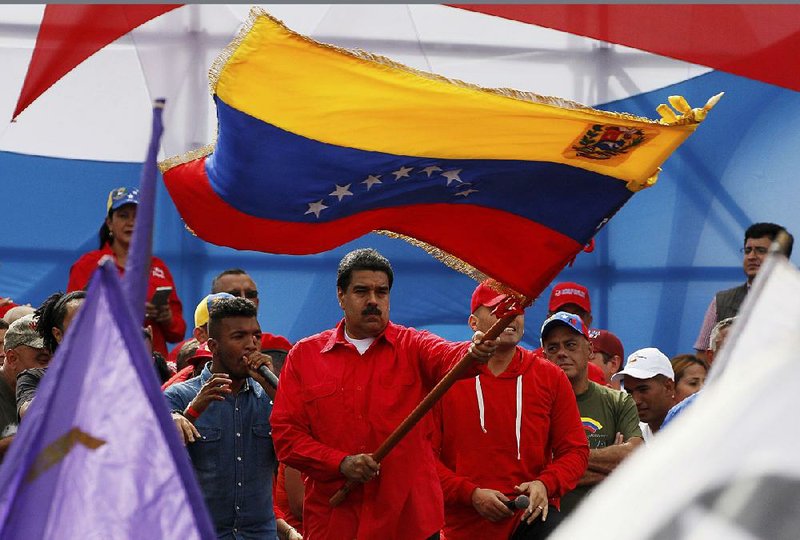CARACAS, Venezuela -- The most recent violence in Venezuela, after months of unrest and just days before a contentious vote to start rewriting its constitution, drove the death toll to above 100 on Thursday.
Most of the dead in anti-government protests that began in April are young men killed by gunfire. The toll also includes looters; police allegedly attacked by protesters; and civilians killed in accidents related to roadblocks set up during demonstrations.
The count by the county's chief prosecutor has been highly politicized, with the opposition and other government agencies reporting varying tolls and causes of death that focus blame on the other side.
When Neomar Lander, 17, was rushed bloody and lifeless to a hospital in early June, officials came out within hours to say he had been killed by a homemade bomb he was carrying. Opposition leaders maintained that he was hit by a canister of tear gas fired by national guard troops standing above the bridge where he was found dead.
"They try to question the humanity of the other side as a political tactic, and I think that ends up discouraging and dismaying people," said David Smilde, a Tulane University expert on Venezuela.
The protests began after a Supreme Court ruling that stripped the opposition-controlled National Assembly of its remaining powers. Though quickly reversed, the decision ignited a protest movement against socialist President Nicolas Maduro fueled by anger over triple-digit inflation, hourslong lines to buy basic food items and deadly medical shortages.
Addressing a multitude of government supporters dressed in red Thursday, Maduro called on Venezuelans to vote in Sunday's election for delegates to an assembly that is to rewrite the constitution.
He posed the vote as a choice that Venezuelans must make between being either "a free country or a colony of the empire" -- Maduro's term for the United States.
Earlier, officials announced a host of security measures that were being enacted, such as an order that no political protests be held through Tuesday. The opposition had earlier called for a demonstration in Caracas today. Washington ordered relatives of U.S. diplomats to leave the Venezuelan capital ahead of the divisive vote.
Opposition leaders are urging Venezuelans to boycott the vote, saying the election rules were rigged to guarantee Maduro a majority and arguing that a new constitution could replace democracy with a single-party authoritarian system.
The mounting deaths of demonstrators have become a separate source of anger for the young people who march during the day and assemble nightly to fight the police and national guardsmen at improvised barricades across the country.
"The ones who have fallen fighting repression motivate us to keep fighting," said Sandra Fernandez, a 21-year-old university student.
The country's chief prosecutor reported Thursday on Twitter that a 16-year-old was killed at a protest in the capital overnight and a 23-year-old man was slain at a demonstration in Merida state. A 49-year-old man in Carababo, west of Caracas, was reported killed during a protest later Thursday afternoon, and a 16-year-old died from a head wound suffered Wednesday at a protest in the capital. Late Thursday, a 30-year-old man was reported killed during a protest in the southwestern town of Merida.
The five killings pushed the death toll of the political crisis to 103. The oil-rich South American country, which was in the second day of a two-day general strike that shuttered businesses nationwide, has also seen thousands of injuries and arrests.
The chief prosecutor's office has released little information about the victims of the unrest, but at least 44 are believed to have been shot while participating in protests. Many of those deaths are blamed on armed motorcycle gangs of government supporters known as "colectivos" who are often seen shooting indiscriminately at protesters while police and troops stand by.
Compared with a spate of protests that left 43 dead on both sides in 2014, Smilde said, "This time around most of it is coming from government forces, either national guard and police or 'colectivos' that are aligned with the government."
Security forces have been accused of excessive force but have used mostly nonlethal arms, a tactic that has kept protest deaths relatively low in comparison with the overall level of violence in a country with one of the world's highest homicide rates. An average of 78 people a day died violently last year in the country of 31.5 million, according to the nongovernmental Venezuelan Violence Observatory.
Lander's mother, Zugeimar Armas, who has kept her son's room intact since his death in early June, said that regardless of whether her son was killed by the national guard or an improvised bomb, she blames the government.
"What need does a 17-year-old boy have to be in the streets?" she asked.
Information for this article was contributed by Jorge Rueda of The Associated Press.
A Section on 07/28/2017
